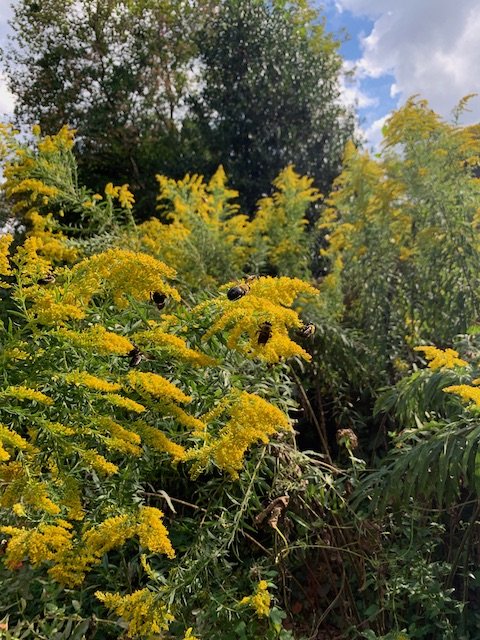Embrace the Magic of Autumn
Planting Perennials in Your Native Garden This Fall
Welcome to our native plant nursery blog, where we're excited to share our passion for native plants and gardening with you! If you're a beginner in the world of gardening or have just recently discovered the charm of native plants, you're in the right place. In this post, we'll delve into the wonderful practice of planting perennials in the fall, a season that offers unique benefits for both plants and gardeners.
Native bees enjoying some goldenrod blooms
Why Fall Planting Matters:
As the summer warmth starts to wane and leaves take on their autumnal hues, many gardeners hang up their gloves, thinking the gardening season is over. But here's a secret: fall is an ideal time to plant perennials in your native garden. Here’s why:
Root Power:
During fall, the soil is still warm from the summer sun, while the air becomes cooler. Additionally, plants are typically finished flowering. This combination encourages perennials to focus all of their energy on developing strong root systems. Healthy roots mean happy, thriving plants come springtime.
Less Stress, More Success:
The milder temperatures of fall relieve your newly planted perennials from the stress of battling extreme heat. With less heat to contend with, they can settle in comfortably without the threat of desiccation or heat stress.
Nature's Watering Schedule:
Mother Nature often provides rainfall in the fall, giving your plants the moisture they need to establish roots. This means you won't need to water as frequently, making your gardening routine more manageable.
Reduced Pest Pressure:
Fall sees a decline in the activity of many garden pests, allowing your perennials to establish themselves with minimal threat from hungry critters. Fewer pests mean fewer headaches for you.
Better Spring Gardens:
By seizing the opportunity to plant in the fall, you're giving your perennials a head start that will pay off come spring. Your fall-planted perennials will come back bigger and stronger than when you first planted them, and they will be just as mature and happy as perennials you planted the previous spring. Fall planting is a strategic approach to ensuring you have a fully developed and established garden come spring.
Take advantage of the opportunity to plant perennials now! A few things to be aware of:
Don’t be alarmed when your fall-planted perennials go dormant! If you’re used to planting in the spring, you might expect your freshly planted perennials to grow and flourish right away. In the fall, all the action is happening with the roots below the surface. You should expect that your plants won’t only not grow very much, but their above-ground foliage will wilt and die as the plant goes dormant for the winter. For this reason, fall planting is a little bit of a leap of faith! Put a little marker (plastic forks work great!) where you planted so you can keep your eye out for your plant to sprout come spring.
Be aware of the last frost date and plant early enough for your plants to have enough warm temperatures and sunlight to grow strong roots. In Charlotte, our average first frost happens by the first week of November, and daylight is too diminished by the first week of December. Our recommendation is to get your perennials in the ground by the first week of October.
Fall planting is only applicable to perennials, trees, and shrubs. None of this is relevant for annuals – any annual will grow until the first frost, at which point it will die and it will not grow back in the spring. Thankfully, native plants are adapted to our climate, so they’re designed to survive the cold. If you’re planting a native plant, you can be confident that it will come back in the spring.
Happy gardening! Come see us at the Uptown Farmers Market on September 9th and 16th to pick out some native perennials to plant this fall.


